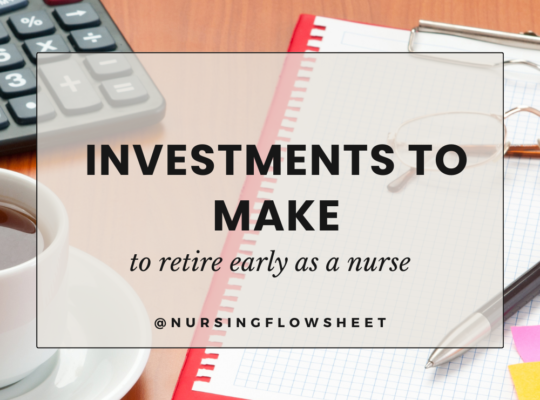Deciding to go back to graduate school to pursue a career as a Nurse Practitioner (NP) is a big decision and you need to know the advantages and challenges of becoming one before pursuing the career. It involves a substantial commitment of time, money, and effort. However, it also opens up a world of opportunities and rewards in the field of healthcare.
In this blog post, I’ll share with you my experience and my thoughts on whether pursuing a career as an NP through graduate school is worth it or not.
When did I decide to go to Nurse Practitioner School?
I decided to go to NP school out of a whim on a busy night shift working in a Neurosurgical ICU – yup, you read it right! There was no pre-contemplation or plans to go to school until that one night. I was given two of the busiest patients in the unit & on my 20 minute lunch break at 3 in the morning, I decided to look up Nurse Practitioner schools in my area.
I applied to the closest program in my city and went back to work after that “break”. Then 2 weeks later, I received an email for an interview. I did 2 rounds of interview to get in the program and after a few weeks, I was invited to the only Physician Assistant/Nurse Practitioner (PA/NP) Dual Track program in the county, I accepted and the rest is history 😀
Prior to accepting that “seat” in the program, I had already contemplated about “not working as a bedside nurse” until retirement. After working for 5 years as an ICU nurse, I realized the toll that it has given my body, physically AND mentally and know that this is not sustainable.
Before I started graduate school, I looked up the advantages and the challenges of pursuing this advanced degree.
Growing Demand for Nurse Practitioners
The demand for Nurse Practitioners in the healthcare industry is on the rise. This demand is driven by several factors, including an aging population, increased healthcare needs, and a growing focus on preventative care. As a result, NPs are playing a vital role in providing primary and specialized care, often working alongside physicians.
Advantages of Becoming a Nurse Practitioner
- Job Security: The demand for NPs is expected to grow significantly in the coming years. This means that NP graduates can enjoy a strong sense of job security and opportunities for advancement.
- Competitive Salary: Nurse Practitioners earn a competitive salary. According to the Bureau of Labor Statistics, the median annual wage for NPs is higher than that of registered nurses. Now this will VARY greatly depending on where you live. I live in California and the pay for jobs in nursing career in general is higher than the rest of the country.
- Independence: NPs often have more autonomy in their practice compared to registered nurses. They can diagnose, treat, and manage a wide range of medical conditions, which can be professionally satisfying.
- Variety of Specializations: NPs can choose to specialize in various areas, such as family medicine, pediatrics, gerontology, or mental health. This flexibility allows you to find a niche that aligns with your interests.
Challenges of Pursuing a Nurse Practitioner Degree
- Educational Investment: Earning an NP degree typically requires a master’s or doctorate. This means a significant financial investment and several years of academic study.
- Decrease Earning Potential as a Nurse: The path to becoming an NP can be demanding, which may impact your work-life balance during your studies. I had to work per-diem nursing while I was attending school which means that there will be a decrease in your earning potential as a nurse. Here are some side hustles you can do while going to school full time.
- Continuing Education: NPs need to stay updated with the latest medical advancements, which often involves ongoing education and certifications.
Is it worth it?
The worth of pursuing a career as a Nurse Practitioner depends on your personal and professional goals. If you value job security, competitive compensation, and the opportunity to make a real impact on patients’ lives, becoming an NP can be highly rewarding. Moreover, you can tailor your specialization to match your interests and passions within the healthcare field.
However, if you’re hesitant about the educational investment and the potential impact on your current nursing income, it’s essential to weigh these factors carefully. Consider talking to current NPs or professionals in the healthcare field to gain a better understanding of the day-to-day responsibilities and demands of the job.
HERE IS A VIDEO of my DAY IN THE LIFE as a NP
For me, being a Nurse Practitioner has been one of the best investments I made in my career. I have increased my salary and was able to have a better work-life balance as a mom. I no longer work weekends and holidays. Keep in mind though that you may not find the “ideal” NP job right when you graduate. It took me 3 years to find a specialty that works for my lifestyle. (I work in Pulmonary and Sleep Medicine)
In conclusion,
Becoming a Nurse Practitioner through graduate school is a significant decision, and it’s important to evaluate whether it aligns with your personal and professional aspirations. While there are challenges associated with pursuing this career path, the rewards in terms of job security, salary, and personal fulfillment make it a compelling option for many individuals. By making an informed decision and being prepared for the journey, you can set yourself up for a successful and fulfilling career as a Nurse Practitioner.
Let me know in the comments what are your thoughts with going to NP school!







